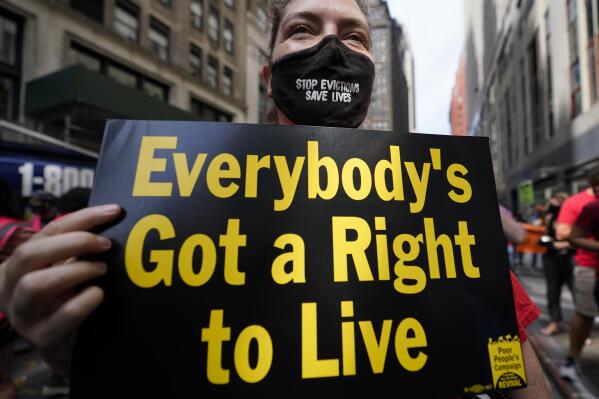AP Explains: NY gov bringing back legislature over evictions
ALBANY, N.Y. (AP) — New York Gov. Kathy Hochul is calling the state legislature into a special session Wednesday in hopes of extending an eviction moratorium for tenants and property owners who fell behind on their rent or their mortgage because of hardships caused by the COVID-19 pandemic.
Hochul, a Democrat, said at a Tuesday evening news conference that she wants evictions put on hold until Jan. 15. The previous moratorium expired Tuesday.
If lawmakers decide to extend the moratorium, they will have to change how it works. In an Aug. 12 ruling, the U.S. Supreme Court nixed part of the moratorium that allowed tenants to pause eviction proceedings simply by filing a form declaring they’d had a pandemic-related hardship.
Hochul said lawmakers are working on a fix that will stand up to legal scrutiny. She said she’s been discussing potential remedies with legislative leaders since before she was sworn in last week to replace former Gov. Andrew Cuomo.
“I want to make sure that we wipe the slate clean for landlords and tenants and let people start with a new start,” Hochul said. “Let them start with a clean slate and move beyond this pandemic, get people back to work, get them back to being able to pay for their own rent.”
Months ago, lawmakers had expected New York wouldn’t still need an eviction moratorium this fall because the state approved a $2.4 billion fund expected to help as many as 200,000 households late on their rent.
But New York has only released a small percentage of that money so far: $200 million as of Aug. 23. Gov. Kathy Hochul has promised to get the money out more quickly.
“We’re not going to abandon our neighbors in need, especially since the state of New York failed in its responsibility to get the money that was allocated by Congress out to the people in need earlier this summer,” Hochul said.
Here’s a look at what tenants and landlords should expect going forward:
___
WHAT LEGAL PROTECTIONS DO TENANTS STILL HAVE?
Even after the moratorium expires, tenants who apply for emergency COVID-19 rental assistance are protected while the state reviews whether they qualify for aid. If they are approved, they can’t be evicted for up to one year for having failed to pay rent because of a pandemic hardship.
___
WHAT PROTECTIONS HAVE ENDED?
With the expiration of the moratorium, property owners who fell behind on mortgage payments because of the pandemic are no longer protected from foreclosure.
Since the Supreme Court ruling, tenants can no longer avoid eviction by filing paperwork declaring a financial or medical hardship because of the pandemic. The justice ruled that process, while convenient for tenants, deprived landlords of their right to challenge the accuracy of those declarations in court.
Hochul said she was confident the process could be refined to protect landlord due process rights. Senate Housing Chair Brian Kavanagh said lawmakers may allow landlords to challenge a tenant’s hardship declaration.
A federal eviction moratorium has also expired. President Joe Biden’s attempt to extend it via an order from the Centers from Disease Control and Prevention was struck down by the the U.S. Supreme Court, which said the public health agency exceeded its authority.
___
WHAT DO LANDLORDS SAY?
Landlords are blasting New York for considering extending the moratorium. S maller landlords say they can’t afford to cover months of more housing debt. Hochul expressed sympathy for property owners who have seen rental income evaporate.
“People have to reframe their image of landlords. Many times, these are small business owners. They are proprietors of a small business, a bodega, a laundromat, a hair salon on the first floor of their business and above they rent out to other people to bring in income, so it’s really a small business crisis,” she said.
___
WILL NEW YORK SEE A FLOOD OF EVICTIONS?
Housing courts in New York move slowly and it is possible that legal bottlenecks and existing tenant protections will prevent a surge of evictions from happening immediately.
But Legal Aid Society attorney Ellen Davidson said eviction cases and notices in New York are already “picking up” since the court ruling. She raised concern about a surge in eviction proceedings amid the highly contagious COVID-19 variant. And she said tenants outside New York City lack the right to an attorney and may not know about eviction protections.
It might also be difficult, she said, for courts to easily learn whether a tenant has applied for rental relief. There is no centralized lookup system to see if a tenant submitted an application and therefore qualifies for a pause in eviction proceedings.










